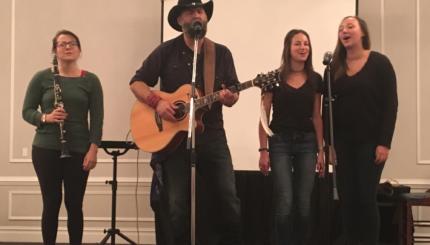Flashback: a few weeks ago, on this very blog, a post about Jewish conferences is published… authored by yours truly (shameless, right?). The piece was about how valuable such gatherings are – so valuable that they should be placed above sleep on our collective priority list. Just weeks after writing that piece, I found myself in Cambridge, Massachusetts for… you guessed it: another Jewish conference.

Southern reunion at Boston airport! Lex, Rabbi Shulamit Thiede of Charlotte, NC, and Walid Musarsaa, a student at Guilford College in Greensboro, NC.
I was at Harvard University for the weekend conference, along with a few hundred others from around the country – in fact, 8 states out of the 13-state ISJL region were represented there! We had all come together for the first-ever conference of Open Hillel.
Open Hillel is a campaign that seeks to broaden the parameters of permissible conversation about Israel and Palestine at Hillel chapters around the country. Those who attended this conference feel that the value of machloket l’shem shemayim, spirited debate for the sake of heaven, should manifest itself even on the question of Zionism; that especially on questions related to Israel and Palestine, which often touch us in the deepest corners of our neshamot (souls), we should be open to a vast array of differing perspectives. Open Hillel believes that all Jews – even those who aren’t Zionists – deserve to be heard and included in Jewish communal conversations.
I learned an unbelievable amount at this inspiring event, attending sessions about human rights, the bounds of the Jewish “Open Tent,” even exploring issues like intermarriage and gender identity. I met wonderful students, recent college graduates, and older community members who were united by their desire to lay it all on the table – to staunchly debate the topics about which we disagree and, as a result, to grow in our knowledge of the issues.
But I had a funny thought while at this conference. Does it relate to my work at the ISJL at all?
The ISJL serves a geographic region; my department, the education department, specifically serves religious schools. The premise of our work is that every Jewish child should have access to an excellent Jewish education. We serve communities with twenty-five students, or five students, or even one single student. They receive access to the same resources that a community with 300 students gets. Every community is welcomed, and none is valued more than any other.
Open Hillel does not serve a particular geographic region. It does, however, serve a Jewish constituency, including a group which, like smaller communities, is occasionally overlooked: those whose perspectives differ staunchly from many Jewish institutions’ stances on Israel and its policies. Open Hillel recognizes that, regardless of any individual’s political stances about Israel, our Jewish institutions must provide a space for all to engage equally; that every Jewish person should have access to an excellent Jewish community.
I believe our Jewish community can and must uphold the ideal of “Eilu v’eilu div’rei Elohim Chayim” – “These and these are the words of the Living God” (Talmud Eruvin 13b). In Talmud, in our synagogue board meetings, and even at our dinner tables, we engage in rigorous debate about issues we deem important. Valuing and participating in debate is not merely part of being Jewish – it is perhaps the basic premise from which the rest of our tradition follows.
Though the focus areas are different, Open Hillel addresses issues of inclusion and empowerment– as does the ISJL. The ISJL knows that the existence and experiences of our wonderful Southern Jewish communities might be totally unknown in other places. Through our work, we build awareness and ensure that Southern Jews are viewed as a vital piece in the beautiful puzzle that is American Jewish Life.
Open Hillel wants to do something similar by demonstrating that harsh critics of Israel – even Jews who are not Zionists – are a crucial part of our community’s make-up. That so many of these people, who some might believe are just apathetic about their Judaism or actively “self-hating,” are as deeply in love with their Jewish identities as those who think differently. The goal these organizations have in common is to foster a diverse Jewish community that will thrive for centuries.
That goal can and should be our Jewish communal Torah. The rest is commentary. Let’s go and do it.
The Jewish world is full of debates. Get the latest in MyJewishLearning’s weekly blogs newsletter.


